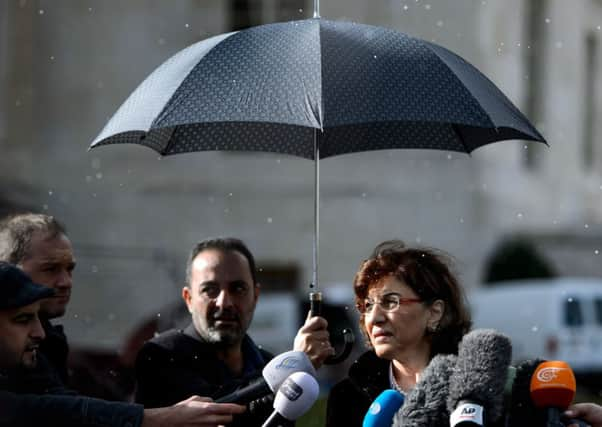Syria peace talks break down after half an hour


The Syrian government has said it will not discuss replacing president Bashar al-Assad as the leader of a country his family has ruled since 1970.
The opposition insists he must step down in favour of a transitional governing body with full executive powers that would lead the country until elections are held.
Advertisement
Hide AdAdvertisement
Hide AdUnited Nations envoy Lakhdar Brahimi managed to get both sides to sit in the same room at the weekend to discuss humanitarian aid to the besieged central city of Homs and a possible prisoner exchange.
A tentative agreement was reached about the evacuation of women and children trapped in Homs before aid convoys go in, although as of last night there had been no progress on the ground.
Mr Brahimi cited security problems for part of the delay. The opposition delegation does not control armed groups inside Syria, including al-Qaeda-backed militants, who do not feel bound by deals done in Geneva.
As yesterday’s talks got under way, the government delegation put forward a paper focusing on the need to combat terrorism and halt funding and shipments of weapons to rebels fighting to topple Mr Assad, delegates said.
Bouthaina Shaaban, an Assad adviser, called the paper an “expression of good will” in search of common ground and said she was surprised the opposition rejected it. “Either these people have no capacity to express their love and care for Syria, or they are ordered by foreign powers to ignore what is most important and most urgent for their country,” she said.
The opposition called the paper a deviation from the main goal of the talks – a transitional government.
Murhaf Joueijati, of the National Syrian Coalition opposition group, criticised government negotiators. “They began to get even more confrontational and began to lecture in a very dictatorial manner,” he said. “We thought there was no point in continuing this since it was going to be a dialogue of the deaf.”
The inability of the two sides to discuss Mr Assad’s future had been expected.
Advertisement
Hide AdAdvertisement
Hide AdOne of the key guiding principles for the Geneva talks – which are aimed at stopping three years of bloodshed in Syria that has claimed more than 130,000 lives, and forced millions from their homes – is the creation of a transitional government that both sides accept.
An opposition spokesman, Monzer Akbik, said: “Today, we will start talking about a new Syria, about transition from starvation to freedom, from torture to human rights and rule of law.”
On the subject of Homs, Mr Akbik said the women and children there should decide whether they wanted to leave or stay after they had received aid.
He accused authorities of blocking a convoy of 12 trucks trying to get into Homs and said: “We will judge the regime by what it does, not by what it says.”
But Ms Shaaban dismissed the aid effort for the city as a distraction. “This is to make a big fuss about taking two trollies to Homs,” she said. “Is this why we came to Geneva?”